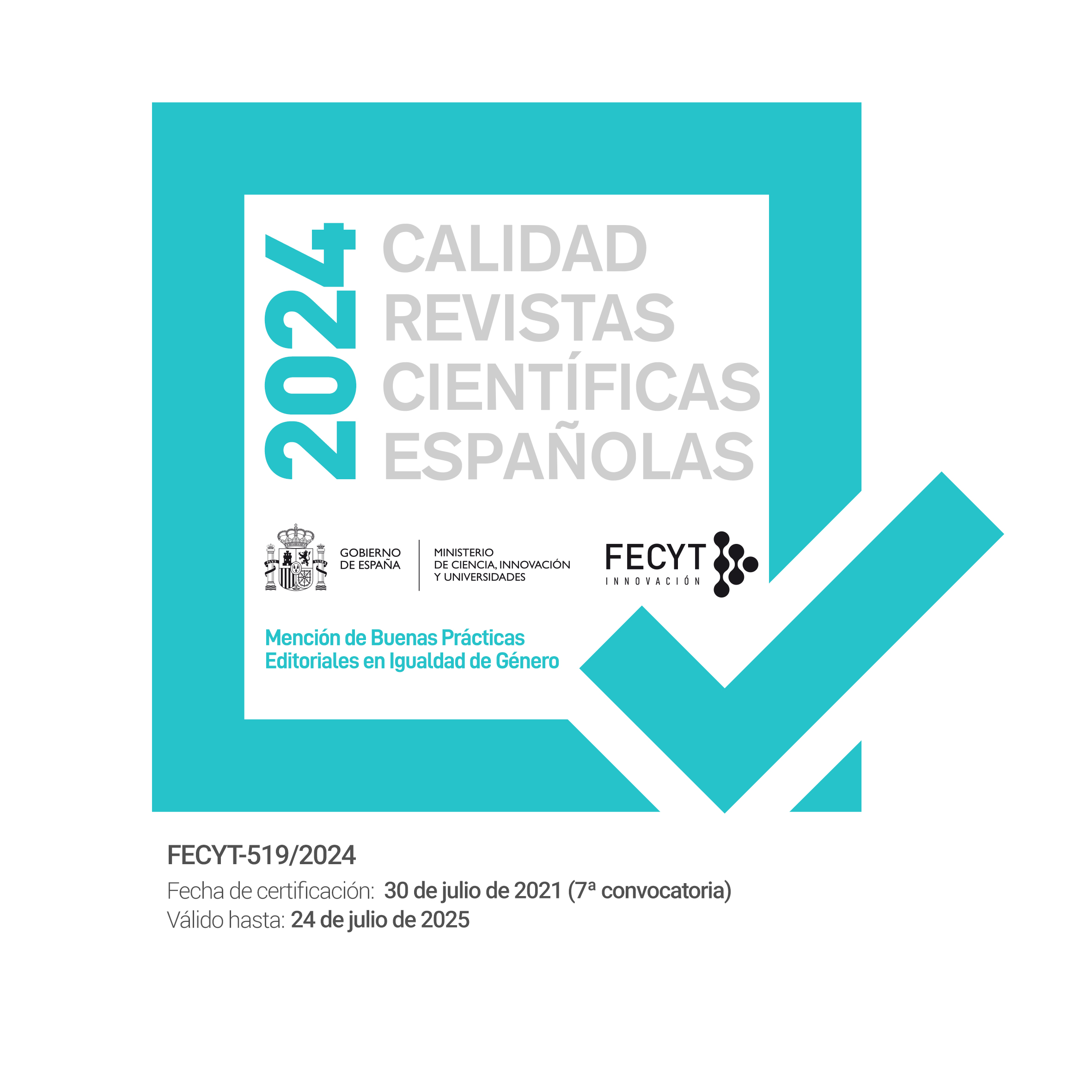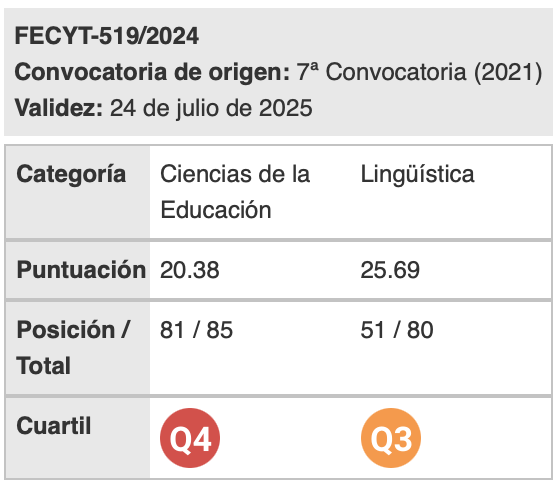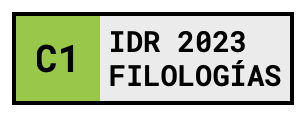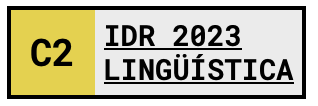Framing research in Food Science: the state of the art on research article, short communication and poster presentation titles
Palabras clave:
Titles, food science, research article, short communication, poster presentationResumen
Titles are the first point of contact with readers and are encoded to provide concise information on the paper’s contents. Data from available surveys show that the structural construction conforms to four different layouts, namely nominal, compound, full-sentence and question, with a prevalence of the former two formats and an increase in the use of the latter ones. The aim of this paper is to discuss the state of the art of title encoding practices in three written genres commonly employed in Food Science: research articles, short communications and poster presentations. Findings indicate the prevalent occurrence of nominal and compound layouts and the lack of question titles in the three genres analysed. Results also show that titles have a mean length of 15.3 words in research articles, of 14.6 words in short communications and of 12 words in poster presentations. The data are shared to offer a framework of current praxis in Food Science and to inform teachers and authors on how to shape informative titles for their research.
Descargas
Citas
Anthony, L. (2001). Characteristic features of research article titles in computer science. IEEE Transactions of Professional Communication, 44, 187-194.
Ball, R. (2009). Scholarly communication in transition: The use of question marks in titles of scientific articles in medicine, life sciences and physics 1996-2005. Scientometrics, 79, 667-679.
Berkenrotter, C. & Huckin, T. (1995). Genre knowledge in disciplinary communication: Cognition/culture/power. Hillsdale, NJ: Laurence Erlbaum.
Busch-Lauer, I. A. (2000). Titles in English and German research papers in medicine and linguistics. In A. Trosborg (Ed), Analysing professional Genres (pp. 77-94). Amsterdam: John Benjamins.
Buxton, A. B. & Meadows, A. J. (1977). The variation in the information content of titles of research papers with time and discipline. Journal of Documentation, 33, 46–52.
ChimAlsi_2012 Book of Abstracts. (2012). Emirates Journal of Food and Agriculture, 24. Available online at http://ejfa.info/ [Accessed 20/07/2012]
Cianflone, E. (2012a). Formatting Titles in Food Science. Saarbrücken: LAP.
Cianflone, E. (2012b). Titles in food science posters: A preliminary survey from the ChimAlsi_2012 Book of Abstracts. English for Specific Purposes World, 12, 1-15.
Cianflone, E. (2012c). Titles in veterinary medicine research articles. Círculo de Lingüística Aplicada a la Comunicación, 52, 3-20.
Dillon, J. T. (1982). In pursuit of the colon: A century of scholarly progress: 1880-1980. Journal of Higher Education, 53, 93–99.
Dillon, J. T. (1981). The emergence of the colon: An empirical correlate of scholarship, American Psychologist, 36, 879–884.
Ferguson, G. (2007). The global spread of English, scientific communication and ESP: Questions of equity, access and domain loss. Iberica, 13, 7-38.
Forray J. M. & Wodilla J. (2005). Artefacts of Management Academe: A discourse analysis of temporality in journal titles. Time and Society, 14, 323-339.
Gesuato, S. (2008). Encoding of information in titles: Academic practices across four genres in linguistics. In C. Taylor (Ed.), Ecolingua: The role of e-corpora in translation and language learning (pp. 127–157). Trieste: EUT.
Giannoni, D. S. (2008). Disciplinary and linguistic identities in the journal editorial genre. In Di Martino G., Polese V. & Solly M. (Eds), Identity and Culture in English Domain-Specific Discourse (pp. 325-348). Napoli: Edizioni Scientifiche Italiane.
Goodman, N. W. (2000). Survey of active verbs in the titles of clinical trial reports. British Medical Journal, 320, 914-15.
Goodman, N. W. (2005). From Shakespeare to Star Trek and beyond: A Medline search for literary and other allusions in biomedical titles. British Medical Journal, 331, 1540-1542.
Haggan, M. (2004). Research paper titles in literature, linguistics and science. Dimensions of attraction. Journal of Pragmatics, 16, 293-317.
Hartley, J. (2005). To attract or to inform: What are titles for? Journal of Technical Writing and Communication, 35, 203-213.
Hartley, J. (2007). Planning that title: Practices and preferences for titles with colons in academic articles. Library & Information Science Research, 29, 553-568.
Hays, J. C. (2010). Eight recommendations for writing titles of scientific manuscripts. Public Health Nursing, 27, 101-103.
Hyland, K. (2009). Academic Discourse. London: Continuum.
Jaime Sisò, M. (2009). Titles or headlines? Anticipating conclusions in biomedical research article titles as a persuasive journalistic strategy to attract busy readers. Miscelánea: a journal of English and American studies, 39, 29-54.
Larsen, P. O. & von Ins M. (2010). The rate growth in scientific publication and the decline in coverage provided by Science Citation Index. Scientometrics, 84, 575-603.
Lewison, G. & Hartley, J. (2005). What’s in a title? Number of words and the presence of colons. Scientometrics, 63, 341–356.
Newman, A. (2011). How to get published, Power Point Presentation, Maastricht University. [Accessed online 09/02/2012] Available at http://www.elsevier.com/authored_subject_sections/L07/pdfs/WhatIsPublishing2.pdf
Pułaczewska , H. (2009). “I bet they are going to read it”: Reported direct speech in titles of research papers in linguistic pragmatics. Lodz Papers in Pragmatics, 5, 271-291.
Siegel, P. Z., Thacker, S. B., Goodman, R. A. & Gillespie, C. (2006). Titles of articles in peer-reviewed journals lack information on study design: A structured review of contributions to four leading medical journals, 1995-2001. Science Editor, 29, 183-185.
Singh, S., Chaudhary, R. & Suvirya, S. (2009). Scientific precision of research papers published in three dermatology journals. Journal of the American Academy of Dermatology Online, 60, e7 [doi: 10.1016/j.jaad.2008.11.012].
Soler, V. (2007). Writing titles in science: an exploratory study. English for Specific Purposes, 26, 90-102.
Soler, V. (2011). Comparative and contrastive observations on scientific titles written in English and Spanish. English for Specific Purposes, 30, 124-137.
Swales, J. (2004). Research Genres. Cambridge: Cambridge University Press.
Swales, J. & Feak, C. B. (1994). Academic writing for graduate students. A course for nonnative speakers of English. Ann Arbor, MI: The University of Michigan Press.
Wang, Y. & Bai, Y. (2007). A corpus-based syntactic study of medical research article titles. System, 35, 388-399.
Yakhontova, T. (2006). Cultural and disciplinary variation in academic discourse: The issue of influencing factors. Journal of English for Academic Purposes, 5, 153-167.
Descargas
Publicado
Cómo citar
Número
Sección
Licencia
Aquellos autores/as que tengan publicaciones con esta revista, aceptan los términos siguientes:
- Los autores/as conservarán sus derechos de autor y garantizarán a la revista el derecho de primera publicación de su obra, el cuál estará simultáneamente sujeto a la Licencia de reconocimiento de Creative Commons que permite a terceros compartir la obra siempre que se indique su autor y su primera publicación esta revista.
- Los autores/as podrán adoptar otros acuerdos de licencia no exclusiva de distribución de la versión de la obra publicada (p. ej.: depositarla en un archivo telemático institucional o publicarla en un volumen monográfico) siempre que se indique la publicación inicial en esta revista.
- Se permite y recomienda a los autores/as difundir su obra a través de Internet (p. ej.: en archivos telemáticos institucionales o en su página web) antes y durante el proceso de envío, lo cual puede producir intercambios interesantes y aumentar las citas de la obra publicada. (Véase El efecto del acceso abierto).

Revista de Lenguas para fines específicos is licensed under a Creative Commons Reconocimiento-NoComercial-SinObraDerivada 4.0 Internacional License.






















